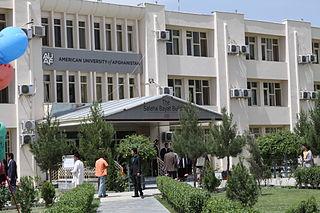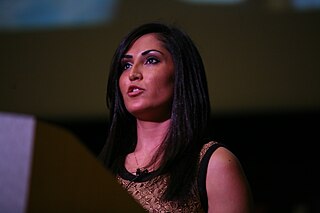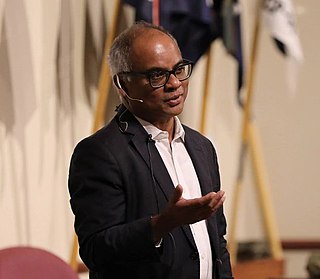Related Research Articles

The Revolutionary Association of the Women of Afghanistan (RAWA) is a women's organization based in Kabul, Afghanistan, that promotes women's rights and secular democracy. It was founded in 1977 by Meena Keshwar Kamal, an Afghan student activist who was assassinated in February 1987 for her political activities. The group, which supports non-violent strategies, had its initial office in Kabul, Afghanistan, but then moved to Pakistan in the early 1980s.

The treatment of women by the Taliban refers to actions and policies by various Taliban regimes which are either specific or highly commented upon, mostly due to discrimination, since they first took control in 1996. During their first rule of Afghanistan (1996–2001), the Taliban were notorious internationally for their misogyny and violence against women. In 1996, women were mandated to wear the burqa at all times in public. In a systematic segregation sometimes referred to as gender apartheid, women were not allowed to work, nor were they allowed to be educated after the age of eight. Women seeking an education were forced to attend underground schools, where they and their teachers risked execution if caught. They were not allowed to be treated by male doctors unless accompanied by a male chaperone, which led to illnesses remaining untreated. They faced public flogging and execution for violations of the Taliban's laws.

Emma Willard was an American female education activist who dedicated her life to education. She worked in several schools and founded the first school for women's higher education in the United States, the Troy Female Seminary in Troy, New York. With the success of her school, Willard was able to travel across the country and abroad to promote education for women. The seminary was renamed the Emma Willard School in 1895 in her honor.

Dr. Massouda Jalal is the first woman in the history of Afghanistan who ran for the Office of the President of Afghanistan in 2002, 2004, and again in 2019. Dr. Jalal emerged as a leading voice of Afghan women after her election as the Representative to the 2002 Loya Jirga as she became one of the frontrunners for the position of Interim President of Afghanistan, opposite to ex-president Hamid Karzai.

Education in Afghanistan includes K–12 and higher education, which is under the Ministry of Education and Ministry of Higher Education. In 2021, there were nearly 10 million students and 220,000 teachers in Afghanistan. The nation still requires more schools and teachers. Soon after the Taliban take took the country in August 2021, they banned girls from secondary education. Some provinces still allow secondary education for girls despite the ban. In December 2022, the Taliban government also prohibited university education for females in Afghanistan, sparking protests and international condemnation. In December 2023, investigations were being held by the United Nations into the claim that Afghan girls of all ages were allowed to study at religious schools.

Christina Lamb OBE is a British journalist and author. She is the chief foreign correspondent of The Sunday Times.

Women's rights in Afghanistan have oscillated back and forth depending on the time period as well as the regime in power. After King Amanullah Khan's attempts to modernize the country in the 1920s, women officially gained equality under the 1964 Constitution. However, these rights were taken away in the 1990s through different temporary rulers such as the mujahideen and the Taliban during the Afghan civil war. During the first Taliban regime (1996–2001), women had very little to no freedom, specifically in terms of civil liberties. When the Taliban was overthrown by the United States following the 9/11 attacks, women's rights gradually improved under the presidential Islamic Republic of Afghanistan. Women were de jure equal to men under the 2004 Constitution.

Roya Mahboob is an Afghan businesswoman. She founded and is CEO of the Afghan Citadel Software Company, a full-service software development company based in Herat, Afghanistan. She has received attention for being among the first IT female CEOs in Afghanistan, where it is still relatively rare for women to work outside the home. On 18 April 2013, Mahboob was named to TIME magazine's 100 Most Influential People in the World for 2013 for her work in building internet classrooms in high schools in Afghanistan and for Women's Annex, a multilingual blog and video site hosted by Film Annex. This was the 10th anniversary of the TIME special edition. The Women's Annex platform give the women of Afghanistan and Central Asia a platform to tell their stories to the world. The TIME magazine introduction to Mahboob was written by Sheryl Sandberg who is the chief operating officer of Facebook and the author of "Lean In: Women, Work and the Will to Lead". U.S. Secretary of State John Kerry met with Mahboob and other Afghan women entrepreneurs at the International Center for Women's Economic Development at the American University of Afghanistan. She is also known for her work with online film distribution platform and Web Television Network Film Annex on the Afghan Development Project. She is an advisor at the Forbes School of Business & Technology.
Sanzar Kakar is an international entrepreneur and business leader. Kakar is the owner of a diversified number of professional businesses.

Safeena Husain is a social worker and founder of Educate Girls – a non-profit organisation that is headquartered in Mumbai, India. It focusses on mobilising communities for girls’ education in India’s rural and educationally backward areas. Under her leadership, Educate Girls’ launched world’s first Development Impact Bond in education which on its completion in 2018 surpassed both its target outcomes.

Shamila Kohestani is an Afghan footballer, and the former captain of the Afghanistan women's national football team. She attended boarding school in the United States at Blair Academy in Blairstown, New Jersey. In 2007, she scored six goals at the women's team's first tournament. In 2006, she won the Arthur Ashe Courage Award.

Farzana Wahidy is an Afghan documentary photographer and photojournalist. She has made photographs of women and girls in Afghanistan. She was the first female photographer in Afghanistan to work with international media agencies such as the Associated Press (AP) and Agence France-Presse (AFP).
Farida Azizi is an Afghan advocate for peace and women's rights. Azizi has consulted with President George W. Bush and Hillary Clinton on women's roles in helping to rebuild Afghanistan. Azizi is a founding member of the Corporation for Peace and Unity in Afghanistan and is a member of the Afghan Women's Network. She one of the subjects of a play, Seven.
Humira Saqib is an Afghan journalist and women's human rights activist. Through her writings in the magazine Negah-e-Zan and in Afghan Women's News Agency, she has been protesting against extreme forms of harassment against women in her radically Islamic country. She has pleaded for parliament to enact laws for the elimination of violence against women. Saqib pursues her efforts to further women's rights by working for the women's news agency as a writer and editor.

Kamal Ahmad is a Bangladesh-born, now U.S. national, educator and social entrepreneur. He led the creation of the Asian University for Women located in Chittagong, Bangladesh in 2006.

Aqeela Asifi is an Afghan woman teacher who has educated thousands of refugee children in Mianwali, Pakistan.
Malala Fund is an international, non-profit organization that advocates for girls' education. It was co-founded by Malala Yousafzai, the Pakistani activist for female education and the youngest Nobel Prize laureate, and her father, Ziauddin. The stated goal of the organization is to ensure 12 years of free, safe and quality education for every girl. As of July 2020, the organization has 48 staff and supports 58 advocates working across Afghanistan, Brazil, Ethiopia, India, Lebanon, Nigeria, Pakistan and Turkey.
Marianne O'Grady is an American teacher and Afghanistan's deputy country director for Care International who said that the Taliban "cannot un-educate millions of people" in the fall of Kabul (2021) and anticipated that women would continue to teach other women and girls, even if forced back "behind the wall".
School of Leadership Afghanistan or SOLA is an all-girls boarding school in Kabul, Afghanistan. It was founded by Shabana Basij-Rasikh. It is the first boarding school for girls in Afghanistan.
Summia Tora is an Afghan campaigner for women's and refugee rights and a social entrepreneur. In November 2023, she was included on the BBC's 100 Women list.
References
- ↑ Lindholm, Jane. "VT Edition Interview: Middlebury College student, Shabana Basij-Rasikh on life in Afghanistan". VPR. Retrieved 6 March 2015.
- ↑ "Shabana Basij-Rasikh". School of Leadership, Afghanistan. Retrieved 6 March 2015.
- ↑ "HELA, inc". LinkedIN. Retrieved 6 March 2015.
- ↑ "Shabana Basij-Rasikh". National Geographic. Archived from the original on May 28, 2014. Retrieved 6 March 2015.
- ↑ "Home". sola-afghanistan.org.
- ↑ "Top Ten College Women 2010". Glamour Magazine. Retrieved 6 March 2015.
- ↑ "Dare to Educate Afghan Girls". TEDx. Retrieved 6 March 2015.
- ↑ "Day of the Girl". Vimeo. 7 November 2012.